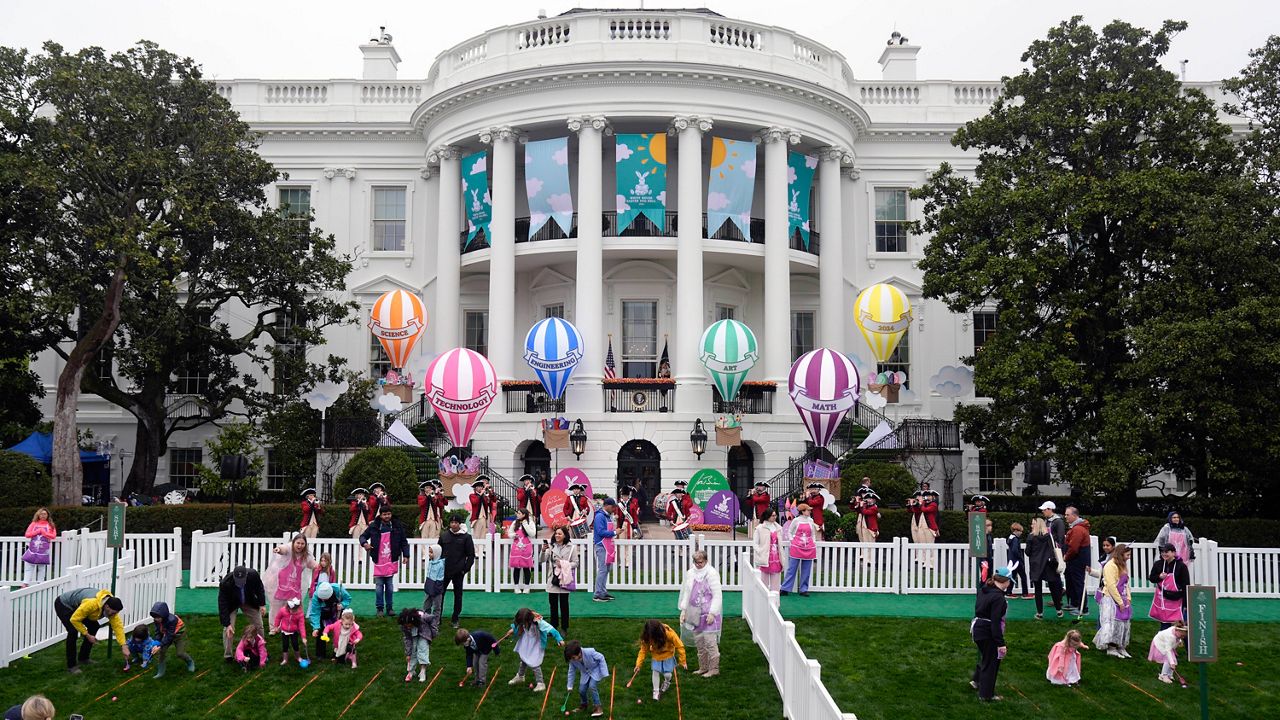For more than six full months, Julie Su’s nomination to become the Secretary of the Department of Labor has been held in political limbo — and the clock is ticking.
Republicans opposed to her are trying to force the issue, angling for President Joe Biden to withdraw Su's name from consideration, with the argument that her continued "acting secretary" status may run afoul of existing law.
Su, who was named a Deputy Secretary of Labor in 2021, has held the top job in acting capacity since March 11, when former then-director Marty Walsh stepped down.
“I'm just really deeply committed to the work of the Department of Labor,” Su said in an interview with Spectrum News. “The President said when he was elected, that he wanted to build an economy where workers do well, he wanted to put together a team that cared about inclusion, and equity, and combating things like systemic racism, those are things that I have worked for my entire career, and so being a part of the administration helping to deliver on that is really exciting to me.”
But her confirmation to become Labor Secretary has been tied up in the Senate owing to stiff opposition from Republicans (and one Democrat, Sen. Joe Manchin of West Virginia, who publicly stated his "genuine concerns with Julie Su's more progressive background") opposed to her ascension.
In July, GOP Rep. Virginia Foxx, R-N.C., sent a letter to U.S. Comptroller General Gene Dodaro making an inquiry of the legality of Su continuing to serve in an acting capacity, citing the Vacancies Act of 1998. The act sets a cap on how long an official can hold a position in acting capacity, at 210 days. Su has been the White House's nominee for 189 days.
Later that month, Reps. Foxx and Kevin Kiley, R-Calif., introduced a bill that aims to ensure Su’s acting role is temporary by instead enforcing the Federal Vacancies Reform Act, which limits an acting officer to 210 days. Just one day later, a group of 20 Senate Republicans sent a letter to Biden also accusing him of circumventing the confirmation process and urging him to withdraw Su’s nomination.
Thomas Berry, a research fellow in the Cato Institute’s Center for Constitutional Studies, says one protection the Biden administration may have is a statute that allows for the deputy labor secretary to perform “such duties as may be prescribed by the Secretary of Labor or required by law” should the secretary die, resign or be removed from office, until a successor is appointed.
“The benefit of this statute, unlike the Vacancies Act, is that it has no time limit at all. It just says, perform the duties of the secretary until a successor is appointed,” explained Berry. “My best guess is that it's actually this statute that [the Biden administration] is relying on rather than the Vacancies Act, given that Julie Su was deputy secretary.”
Berry also pointed to the Supreme Court decision in United States v. Eaton, an 1898 Supreme Court ruling which clarified the Constitution’s Appointments Clause to state that the secondary officers can be authorized to temporarily exercise the powers of a principal officer without being confirmed.
“There's a big difference between acting secretaries who are not confirmed by the Senate to anything versus acting secretaries who were confirmed by the Senate to some other high ranking job. And in this case, Julie Su was confirmed by the Senate to the position of Deputy Secretary,” Berry said. “So in my view, that gets rid of any constitutional concerns, because the Senate has essentially already vetted her for the second highest ranking position in the Department of Labor” — since the Senate would presumably know that one of the top responsibilities of a deputy secretary is that they may have to perform the duties of the secretary.
Still, some Republican lawmakers argue that the administration is ignoring the Constitution.
“The Biden administration is attempting to circumvent Congress and the Constitution to invoke Department of Labor's succession act, which they claim allows them to have Ms. Su serve as Acting Secretary of Labor indefinitely, even though lacking the votes for confirmation. This is unacceptable,” said Sen. Bill Cassidy, R-La., Tuesday. Cassidy is the ranking member on the Senate Health, Education, Labor, and Pensions committee through which Su’s nomination was passed back in April, and has been an outspoken critic of her record.
“I'm introducing legislation that will prevent Ms. Su from serving as Acting Secretary of Labor beyond 210 days. This bill aligns the Department of Labor's succession clause with the Vacancies Act to prevent further abuses of the Constitution, ensuring the Senate's role to provide advice and consent is preserved,” he continued. “I'll remind my colleagues that former labor secretary Marty Walsh received strong bipartisan support for his unquestionable experience on questioning immunizations and handling negotiation. He worked to develop trust from both labor unions and the business community. However, Ms. Su not appear to be in that mold.”
The White House continued to support Su’s nomination, in spite of calls for the President to withdraw the nomination. Sources within the administration say the White House is still holding war room calls — regular status updates on Su’s nomination — that Spectrum News first reported on back in June. A White House spokesman said Tuesday the administration has “still unwavering support” for Su’s nomination.
Julie Su’s ascent to becoming the nation’s foremost advocate for workers has been a long time coming, dating back to the mid-1990s, as an attorney representing at-risk communities in Los Angeles. Before joining the federal government, she was California State Labor Commissioner under Gov. Jerry Brown, then California Secretary of Labor under Gov. Gavin Newsom.
Su became most well-known in labor law circles for representing dozens of trafficked garment workers in a civil suit against the captors, factories and retailers that profited off of their labor, a case that eventually led to the creation of two new visa types for certain victims of crimes and affirmed her resolve to protect vulnerable and marginalized workers.
“That’s why I am so honored — and excited — to join the U.S. Department of Labor as the Deputy Secretary of Labor to carry on this important work. And I’ve long been familiar with the critical role the department plays in protecting workers,” Su wrote in a blog post, shortly after she was named Deputy Secretary of Labor, in 2021.
Despite ongoing opposition to the process, Su remains hopeful that she will be confirmed as the next Labor Secretary.
“As long as I'm in this seat, I have an important job to do. The American people expect me to do it, workers need a strong Department of Labor that is going to connect people to good jobs, that's going to enforce basic labor standards, that's going to pursue policies that benefit working families,” Su said. “So I'm going to keep on doing that.”









